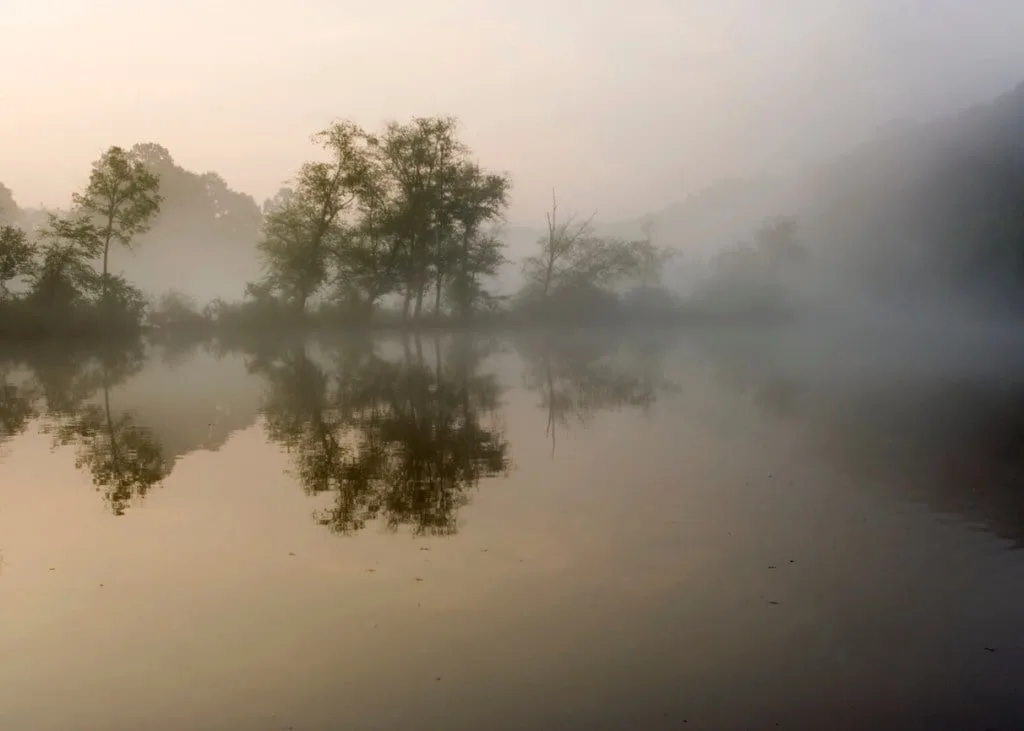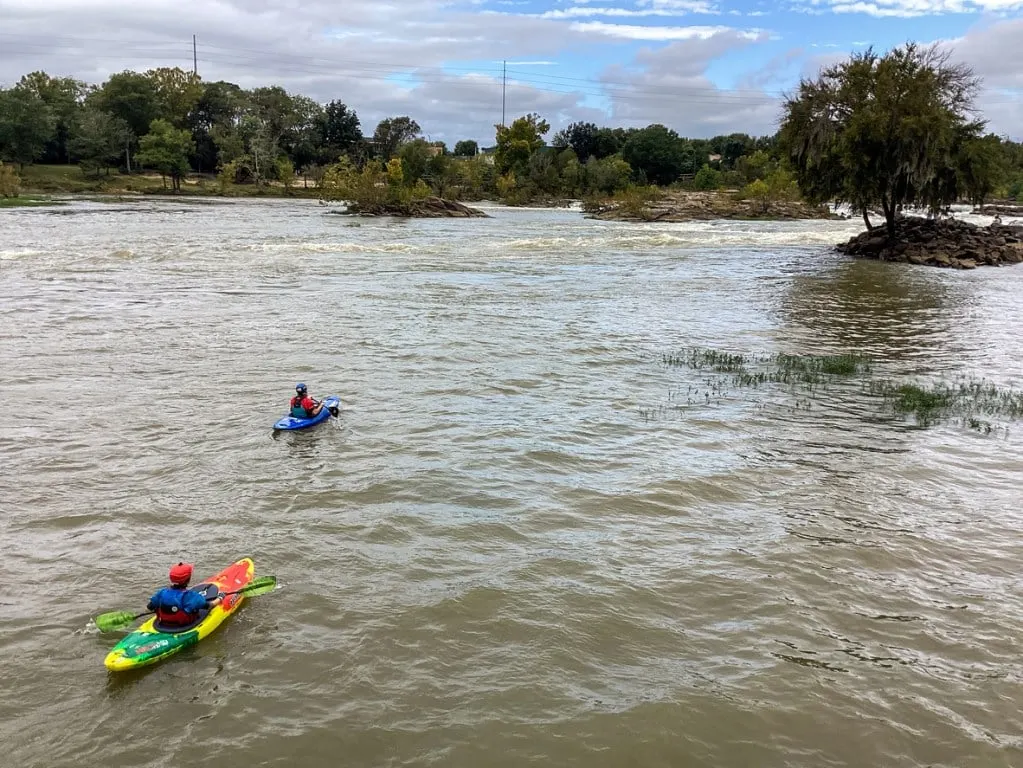From the mountains to the plains, the ancient Chattahoochee River’s secrets run deep.
It has been an important resource for millennia, and yet the mystery hangs on. What, exactly, is it hiding?
Today, we’re exploring the secrets of the Chattahoochee River to answer your questions.
Let’s dive in!

Fascinating Chattahoochee River Secrets to Know
Most folks who aren’t from Georgia might think they know the secrets of the Chattahoochee River because of country music icon Alan Jackson. His upbeat tune paints a picture of summertime in the South.
But for many, this beloved waterway is a part of life. When the weather’s nice, you can spot people floating along the current in tubes and kayaks. According to officials, it’s among the busiest waterways in the region for recreation.
However, Indigenous Americans relied on it for millennia. Long before Europeans arrived, Creek and Cherokee peoples inhabited the region.
One Kolomoki site dates back to 1,000 BC. We know of at least 16 ancient settlements along the Chattahoochee River, and those are just the ones on its southernmost stretch.
Several significant archaeological locations, including the Omussee Mound, McIntosh Reserve Park, and Dugout Canoe Discovery area, help modern researchers understand these prehistoric cultures. Even its name comes from Creek and Muskogee words meaning “painted rock.”
In the 1820s, riverboats began transporting goods along the waterway. Soon, several textile and gristmills were built, using the current to power their operations. After World War I, more businesses relied on it for hydroelectric energy.
Today, its greatest asset is as a source of fresh drinking water. In fact, it supplies most of the folks in the metro Atlanta area, tapping out at around 300 million gallons each day. Its 13 dams and 16 hydroelectric power plants mean it’s also a critical energy source.
It’s also an essential ecosystem for native flora and fauna. It’s one of only two sources of freshwater trout running through a major city. Plus, dozens of species of salamanders, frogs, toads, and aquatic turtles live in or around it.
You might even spot an American alligator lurking on the shores.
Do You Know: Why Is the Chattahoochee River so Dirty?
Where Is the Chattahoochee River?
It’s no secret that the Chattahoochee River starts as a trickle in the northeastern corner of Georgia. From there, it meanders from the Blue Ridge Mountains in a southwesterly direction for 434 miles. Eventually, it forms part of the border between its home state and Alabama.
Once it crosses into Florida, it becomes the Apalachicola River and flows for another 160 miles before emptying into the Gulf of Mexico.
This region is known as the Apalachicola-Chattahoochee-Flint basin. Altogether, more than 8,700 square miles drain into it.
Traditionally, the fall line, where the Piedmont region flattens out into the Coastal Plain, made an excellent site for mills and factories. Traditionally, waterfalls were common here, and vessels heading upstream from the Gulf of Mexico came to an impasse. However, these days, you’ll find more dams than falls.
What Is the Story Behind the Song, Chattahoochee?
Alan Jackson and songwriting pal Jim McBride wrote the hit Chattahoochee over about two days. They were on the road at the time.
They were in Tallahassee, Florida, when Jim shared his idea for a tune about the river. By the time they played in Thibodeaux, Louisiana, the next day, it was ready to go. In fact, they performed it live that very night.
McBride later said Sydney Lanier’s poem, Song of the Chattahoochee, inspired him.
It’s about a carefree adolescence and summertime in the Deep South. It appeared on the 1992 album A Lot About Livin’ (And a Little ’bout Love) and won awards for Song of the Year and Single of the Year.
If it isn’t already running through your head, we suggest giving it a listen.
Best Places to Stay Near the Chattahoochee River
People flock to the Chattahoochee River for the countless recreational activities, that’s no secret. After all, it’s a haven for anglers, swimmers, and kayakers. Although it stretches the length of the state, we’ll focus on the best spots to post up in North Georgia.
Here are a few great options.
Upper Chattahoochee River Campground
If you’re craving a jaunt out in nature, the Upper Chattahoochee River Campground is worth a stay. It’s high in the misty mountains of North Georgia, not far from the headwaters.
Other than a few port-a-potties, don’t expect any amenities. This is a primitive camping area, and you must abide by certain restrictions, such as quiet hours. But the natural beauty surrounding you’ll be worth it.

The 34 sites have a picnic table, lamppost, and grill and are wheelchair accessible.
They don’t accept reservations, relying on a first-come, first-served system. But once you’re here, you can enjoy the unspoiled wilderness. Take the short hike to Horse Trough Falls, or cast a line and try to catch your own dinner. Just be aware that you’ll need a fishing license.
When you’re ready to return to civilization, consider a stop in nearby Helen, Georgia. This Bavarian village features shops, restaurants, and galleries catering to their many visitors.
If hiking is your thing, check out this Chattahoochee Trails Guide.
Lake Lanier
North Georgia’s Lake Lanier is part of the Chattahoochee River. You can enjoy over 700 miles of pristine shoreline. Boating, skiing, and fishing are all incredibly popular. You’ll find plenty of places to rent a vessel for the day if you don’t bring your own.
More than a dozen campgrounds sit on or near the lakeshore. Perhaps you want to boondock in seclusion. Or maybe you’d rather go glamping in the lap of luxury. Whatever your preference, you can find it here.
In fact, many folks love the area for its world-class golf courses and spas.
If you want to live it up, visit Lanier Islands Water Park, also known as Margaritaville. Race your friends down the dual waterslides, frolic at a kid-friendly foam party, or enjoy a tasty meal at one of the many on-site restaurants.
We found 5 Famous Movie Sites You Can Visit in Atlanta, Georgia!
Chattahoochee Bend State Park
One of the largest state parks in Georgia is about an hour southwest of Atlanta. It features nearly 3,000 acres of woodlands and five miles of Chattahoochee Riverfront. You can explore the trails on foot and on mountain biking paths. And, of course, fishing, boating, and paddling opportunities are plentiful as well.
You’ll pass through Class I and II rapids if you choose to kayak. Most folks who go this route choose to bring two vehicles, as there’s no shuttle service available.
They have 37 RV sites, 12 tent-only spots, and eight backcountry locations you can hike or kayak to. You’ll need to make a reservation to stay here as they fill up quickly.
The staff offers many ranger-led interpretive programs, such as Painting in the Park and the Sailing Towards the Sun Astronomy Program. This is one destination you won’t want to miss!
Uncover the Secrets of the Chattahoochee River for Yourself!
There’s no shortage of secrets along the famed Chattahoochee River. And while many people only see it as a source of recreation, this area holds plenty of history, too.
This beloved waterway has fed and fueled civilizations for centuries and shows no sign of slowing down. We suggest making the trip and soaking up all the region has to offer!
Discover the Best Free Camping Across the USA
To be honest with you, we hate paying for camping. There are so many free campsites in America (with complete privacy).
You should give it a try!
As a matter of fact, these free campsites are yours. Every time you pay federal taxes, you’re contributing to these lands.
Become a FREE CAMPING INSIDER and join the 100,000 campers who love to score the best site!
We’ll send you the 50 Best Free Campsites in the USA (one per state). Access the list by submitting your email below: